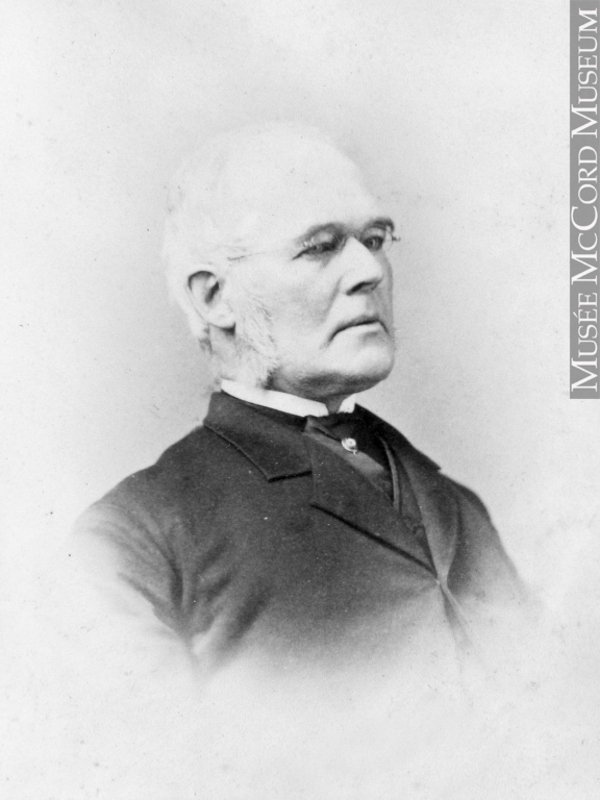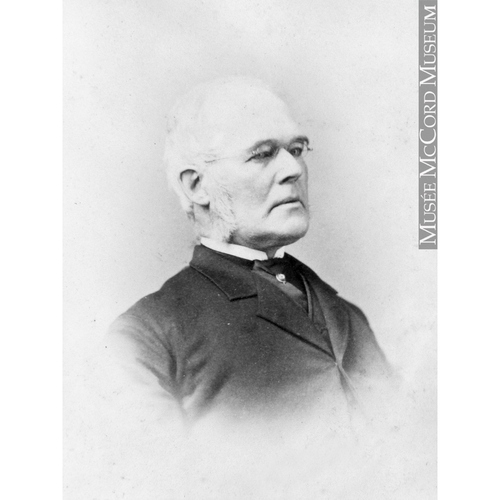
Source: Link
MAGUIRE, JOHN, lawyer, judge of the Superior Court; b. April 1810 at Maguire’s Bridge in Fermanagh County, Ireland, son of Matthew Maguire and Catherine O’Hara; d. 5 July 1880 at Quebec.
John Maguire arrived in Canada in 1823 with his parents. He attended the Petit Séminaire of Quebec and completed his classical education there. He then received legal training in the office of William Power, and on 20 Sept. 1834 became a member of the bar.
During the 1837 insurrection John Maguire marched under the standard of the Patriotes. He then rallied to the party of Louis-Hippolyte La Fontaine* and offered himself as a candidate on the Liberal-Conservative ticket for the city of Quebec, but was defeated. From then on he turned his talents to municipal politics. Maguire had been a member of the city council for the district of Champlain since 1846 and he occupied this post until 1854. In 1852 he also became inspector and superintendent of police for the city of Quebec. The following year, the English Protestants of Quebec accused him of negligence in carrying out his duty at the time of the riot caused by Alessandro Gavazzi, a fanatical, anti-Catholic Italian who had come to Quebec to give lectures against “papism” [see Charles Wilson]. An inquiry conducted by two Protestant justices of the peace cleared Maguire of all blame. Still in the setting of municipal administration, he was active on the aqueduct committee, where he exerted all his influence to provide Quebec City with the water services it needed.
In 1852 Maguire was appointed judge of the Court of Sessions of the Peace for the district of Quebec. Sixteen years later he became judge of the Superior Court for the district of Bonaventure, and, from 1 Sept. 1873, for the district of Rimouski. In 1877, with two of his colleagues, Judges Thomas McCord and Louis-Napoléon Casault, he had the courage to deliver a judgement condemning the Catholic priests of Bonaventure County, who during the previous electoral campaign had supported the Conservative candidate by using their spiritual authority. As Judge Maguire refused to retract, he incurred the wrath of Bishop Jean-Pierre-François Laforce* Langevin, and the bishop excommunicated him. This sentence was lifted by Bishop George Conroy in the autumn of 1877.
At his death, on 5 July 1880, he left his wife, Frances Agnes Horan, sister of Bishop Edward John Horan, the first principal of the école Normale Laval, and nine of his 14 children.
Rapport des commissaires nommés pour faire une enquête sur la conduite des autorités de police lors de l’émeute de l’église Chalmers, le 6 juin 1853, avec les minutes des procédés et des témoignages rendus devant la dite commission (Québec, 1854). Journal de Québec, 25 oct. 1853; 6 juill., 9 juill. 1880. Morning Chronicle (Quebec), 6 July 1880. Quebec Mercury, 8 July 1880. F.-J. Audet, “Commissions d’avocats de la province de Québec, 1765 à 1849,” BRH, XXXIX (1933), 587. P.-G. Roy, Les juges de la province de Québec, 335. Robert [Philippe] Sylvain, “Séjour mouvementé d’un révolutionnaire italien à Toronto et à Québec,” RHAF, XIII (1959–60), 183–229.
Cite This Article
Béatrice Chassé, “MAGUIRE, JOHN,” in Dictionary of Canadian Biography, vol. 10, University of Toronto/Université Laval, 2003–, accessed December 29, 2024, https://www.biographi.ca/en/bio/maguire_john_10E.html.
The citation above shows the format for footnotes and endnotes according to the Chicago manual of style (16th edition). Information to be used in other citation formats:
| Permalink: | https://www.biographi.ca/en/bio/maguire_john_10E.html |
| Author of Article: | Béatrice Chassé |
| Title of Article: | MAGUIRE, JOHN |
| Publication Name: | Dictionary of Canadian Biography, vol. 10 |
| Publisher: | University of Toronto/Université Laval |
| Year of publication: | 1972 |
| Year of revision: | 1972 |
| Access Date: | December 29, 2024 |



